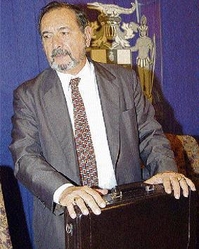Cement waiver upheld by CCJ - TCL 'welcomes clarity' of CET suspensions
Published: Wednesday | August 12, 2009

Michael de la Bastide, president of the Caribbean Court of Justice. - Norman Grindley/Chief Photographer
Trinidad Cement Company (TCL), the parent of seven firms involved in the production and sale of cement in the Caribbean, says it welcomes the clarification of the Common External Tariff (CET) suspension process within the region, even as it was still reviewing Monday's decision by the Caribbean Court of Justice (CCJ).
The court decided to uphold the September 2008 approval by the Caricom Secretariat for a request from the Jamaican government for a temporary waiver of the 15 per cent duty on cement from outside the 15-member regional bloc.
The approval by Caricom's secretary-general, Edwin Carrington, granted for one year from September 10 last year, allowed duty free importation of 240,000 tonnes of cement from extra-regional sources, opening the door to a spike in imported cement on the Jamaican market, which TCL and is local subsidiary, Caribbean Cement Company Limited (CCC) say has eroded their market share.
Requests
TCL had hauled the Caricom Secretariat before the regional court, which, under the Revised Treaty of Chaguaramas, has jurisdiction over regional trade matters. TCL's court action sought to quash the decision in respect of Jamaica, ,as well as the November 2008 decision of the community's Council for Trade and Economic Development (COTED) to approve similar requests from other member states, Antigua, Dominica, Grenada, Saint Lucia, St Kitts, Suriname and St Vincent and the Grenadines.
TCL had contended that it had the capacity to supply all the markets and had not been consulted in the case of Carrington's approval.
In the CCJ decision, President Michael De la Bastide ruled against TCL's application for both decisions to be overturned.
But the court gave the administrative structure for the regional integration movement a slap on the wrist for what it described as a procedural flaw in Carrington's approval of Jamaica's request.
The ruling noted that whereas the regulations governing CET suspensions require other
"In the circumstances, it was wrong for the secretary-general to accept, as a sufficient answer to his inquiry, regarding a request for suspension by Jamaica, the response of Trinidad and Tobago that it had "no objections" to Jamaica's request," the CCJ ruling held.
Caricom was ordered to pay half of TCL's legal costs.
"While the company would immediately be reviewing the judgment in consultation with its attorneys for further insight to the basis for the ruling, (it) was heartened by the fact that it provided for procedural clarity in relation to the decision making process pertaining waivers of the CET," TCL said in its initial response yesterday.
Manager of Investor Relations and Corporate Communications, Alan Nobie, noted that, "Despite acknowledging a flaw in one aspect of the procedures followed by CARICOM) the Caribbean Court of Justice has not invalidated the waiver of the CET on imported cement in the region."
The company said that from the onset it had sought to clarify the procedures and principles that guide the suspensions of CET.
"We are of the view that this judgment brings greater clarity to the process going forward. We expect that this will not only prevent any similar situations for the TCL Group in the future but will also act in the interest of other regional manufacturing entities. It is imperative that unambiguous procedures are in place and observed," the TCL statement said.
Modernisation thrust
The TCL official pointed out that the group, "remains well poised to adequately supply the region's demand for cement, especially with its recent expansion and modernisation thrust at its Jamaican operation, Caribbean Cement Company, where a new state-of-the-art kiln was commissioned in August 2008, increasing the company's capacity. Furthermore, the TCL Group, based on an independent audit of the supply capacity and demand for cement in the region, is able to fully supply the regional demand in 2009".
The company said it would issue a more detailed statement after completing its review of the CCJ's judgment.
In arriving at it decision, the CCJ pointed to what could be described as a balancing act on its part.
"The Court had to be careful not to frustrate or hinder the ability of community organs and bodies to enjoy the necessary flexibility in their management of the commu-nity," the ruling said.
"The decisions of such bodies will invariably be guided by an assessment of economic facts, trends and situations for which no firm standards exist."





















